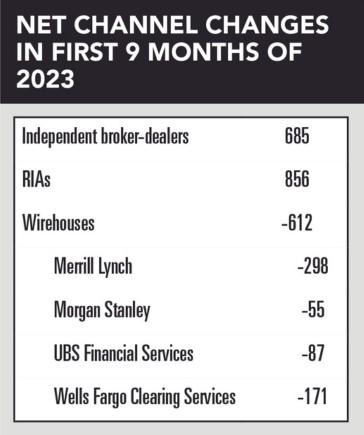

This will be another year of transition at the four wirehouses – Merrill Lynch, Morgan Stanley, Wells Fargo Advisors, and UBS – as each seeks to find stability after last year’s significant changes.
The greatest instability each of the four firms faces is the continued diaspora of its financial advisors, the most productive and profitable in the wealth management industry. Financial advisors at the four large firms routinely generate more than $1 million on average in fee and commission revenue annually and work with the wealthiest group of clients.
But they continue to leave the wirehouse firms, which spend handsomely on marketing to new clients, to work at registered investment advisors or independent broker-dealers, where financial advisors take home a much bigger chunk of the revenues they produce but have to pay for their own offices and other expenses.
According to InvestmentNews research, the RIA channel saw a net gain of 856 financial advisors over the first nine months of last year, with independent broker-dealers posting a net gain of 685.
Wirehouses, meanwhile, continue to bleed financial advisors, with a net decrease of 612 over that same period. It’s been that way since the credit crisis of 2008; the Big Four have seen a steady drip of financial advisors leaving, helping fuel the boom in the RIA market.
2024 will be little different, particularly in the wake of the series of changes last year.
“The wirehouses are dying, but we just don’t have a date yet to put on the tombstone,” said Danny Sarch, an industry recruiter. “One challenge is their financial advisors are leaving to other channels, and another is figuring out how to replace them.”
“In general, the executives at the top of these firms are bright and committed to their businesses,” Sarch said. “But they also are generally a bit older and may be managing toward bonuses over the next few years as opposed to the long-term consideration of the wealth management franchise as a whole.
“The mindset is, how can I survive another year at the top, instead of the next decade,” he added.
The financial advisor diaspora has been an ongoing issue for Wells Fargo Advisors.
At the end of 2022, Wells Fargo Advisors reported a financial advisor head count of 12,027, or roughly 3,000 less than in 2016, when the news first hit that Wells Fargo bank employees had secretly created millions of unauthorized accounts in the names of customers without their consent. The bank was fined $185 million and then-CEO John Stumpf resigned abruptly.
The firm has changed senior management in the past few years and shifted its strategy to drive more growth in its independent broker-dealer and RIA business, creating an easier path for its advisors to move to that business rather than leave for a competitor.
That emphasis should continue in 2024.
“We really do believe that five years from now, the independent channel will be our biggest channel,” Barry Sommers, CEO of Wealth and Investment Management, said in an interview last year with Bloomberg News.
Meanwhile, Morgan Stanley and Merrill Lynch last year saw senior leaders change roles or leave, raising questions about the tactics and strategies for the wealth management businesses at each bank.
In the aftermath of the credit crisis, Morgan Stanley’s departing CEO, James Gorman, placed a big bet on retaining financial advisors and adding services and technology for their benefit. And Merrill saw wealth management head Andy Sieg, who had been trying to jump-start its training of young financial advisors, jump to Citigroup last year.
Ted Pick replaced Gorman as CEO of Morgan Stanley this month.
In 2010, when Gorman was co-president of Morgan Stanley, before taking the reins as CEO from John Mack, the percentage of the bank’s pretax profit from its wealth and investment management group was about 26 percent. Now it’s up to 52 percent. Will Pick increase the firm’s reliance on wealth management or refocus on investment banking and trading?
At Merrill, Sieg’s role was absorbed by Lindsay Hans and Eric Schimpf, who were named co-presidents of Merrill Wealth Management, reporting to Bank of America CEO Brian Moynihan.
Change was a constant throughout last year for UBS’ 6,000 or so financial advisors in the United States as the Swiss bank worked through a giant merger. UBS Group said in June it had completed its acquisition of Credit Suisse Group and then announced the various teams that will lead the bank’s businesses, including global wealth management. Iqbal Khan is president of global wealth management at UBS. Jason Chandler remained head of Americas wealth management, which has been his position since the start of last year.
“Adding to the feeling of instability is the compensation plan at each of the Big Four firms,” Sarch said. “The trend is down, and the firms change it each year.”

For example, Morgan Stanley’s 15,000 financial advisors will have to work harder in 2024 and generate more revenue to earn the same amount of take-home pay as they did this year. The wirehouse is raising its incentive compensation grid by 10 percent next year.
That means that financial advisors who produced revenue near $1 million this year will have to increase that by 10 percent, or generate $1.1 million in fees and commissions, to take home the same percentage of revenue as they did this year.
“At least Gorman had a plan to keep financial advisors in place, and introduced deferred income, making it more expensive when they leave for an RIA,” Sarch said. “But that was years ago, and no one right now is as forward-thinking as he is.”

Rajesh Markan earlier this year pleaded guilty to one count of criminal fraud related to his sale of fake investments to 10 clients totaling $2.9 million.

From building trust to steering through emotions and responding to client challenges, new advisors need human skills to shape the future of the advice industry.

"The outcome is correct, but it's disappointing that FINRA had ample opportunity to investigate the merits of clients' allegations in these claims, including the testimony in the three investor arbitrations with hearings," Jeff Erez, a plaintiff's attorney representing a large portion of the Stifel clients, said.

Chair also praised the passage of stablecoin legislation this week.

Maridea Wealth Management's deal in Chicago, Illinois is its first after securing a strategic investment in April.
Orion's Tom Wilson on delivering coordinated, high-touch service in a world where returns alone no longer set you apart.
Barely a decade old, registered index-linked annuities have quickly surged in popularity, thanks to their unique blend of protection and growth potential—an appealing option for investors looking to chart a steadier course through today's choppy market waters, says Myles Lambert, Brighthouse Financial.
